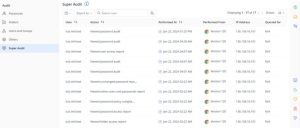Fintech companies like Kabbage were deputized by the SBA to help process a deluge of loan applications the agency couldn’t handle on its own.

Image: primo-piano, Getty Images/iStockphoto
As the growing COVID-19 pandemic closed businesses across the nation in March, the US government created an emergency Payroll Protection Program (PPP) to help struggling small businesses continue paying workers until they can reopen. But with expectations of millions of applications coming in, the US Small Business Administration (SBA), which was designated to handle the program, needed help to handle the deluge.
SEE: Coronavirus: Critical IT policies and tools every business needs (TechRepublic Premium)
That’s where financial technology (fintech) companies like Kabbage.com came in to assist, using technologies including artificial intelligence (AI) and machine learning (ML). Early in the COVID-19 crisis, the SBA sought out non-banking fintech specialists to join the agency in processing all the applications that the SBA couldn’t handle on its own using its existing technologies. Traditional SBA loan processes meant manual reviews with human underwriters checking every fact and data point in an application. To speed things up, the SBA selected and deputized a host of fintech companies to help in the massive PPP effort, including Kabbage, PayPal, Square, BlueVine, and Intuit, and asked them to put processes in place to make it happen.
The numbers of PPP applications are staggering–in 2019, before the pandemic, the SBA distributed $28 billion in loans to about 63,000 applicants as part of its traditional loan program. Today, though, that’s been hugely overshadowed by 2020’s emergency PPP program, which through June 6 had approved 4.5 million PPP applications so far involving about $511 billion in payroll loan money. Clearly, the agency needed lots of assistance to meet the crushing demand.
As one of the fintech companies selected to assist in the PPP efforts, Kabbage, which was founded in 2009 as an online small business lender, quickly got to work to update its platform, which integrates AI and ML, to handle the incoming PPP applications as a newly-designated and approved SBA lender.
For Kabbage, one of the biggest things it had to change was adding capabilities that allow direct uploads of payroll documentation from small business applicants for the PPP loans, said Kathryn Petralia, cofounder and president of the company. In the past, Kabbage didn’t directly receive such paperwork from its loan applicants, instead getting the data electronically from third parties such as bank checking accounts through APIs as part of the process.
But SBA loans require old-fashioned paper-based payroll records, including tax records. Those applications typically were conducted in the past through face-to-face bank meetings, so Kabbage had to adapt its systems to make it all work. With social distancing rules in place due to COVID-19, none of that can be done today in a physical bank office.
SEE: Life after lockdown: Your office job will never be the same–here’s what to expect (cover story PDF) (TechRepublic)
“Before COVID-19, Kabbage already had AI and ML in place to help verify that applicants were who they said they were for security and anti-fraud purposes,” Petralia said. “We were able to build onto that quickly to adjust to the new needs of the SBA program.”
Within two weeks, Kabbage developers rebuilt the platform to fulfill the needed requirements for the SBA PPP program. A new algorithm was created that brings together optical character recognition (OCR), AI, and ML to process the uploaded payroll documentation and sort it into the data needed in the SBA PPP applications. The algorithm analyzes, verifies, and classifies the submitted documents and extracts the required information to verify the applicant’s self-reported average monthly payroll figures. Once completed, the system sends the completed applications on for approval.
“We automated the ingestion of payroll data, which is the data used under the PPP program, so we could better serve customers who are applying for the loans,” Petralia said. “The automation and verification of the submitted documents is mimicking teams and teams of loan underwriters who normally process such applications for banks. Our system was able to do that for us.”
For Kabbage, that AI- and ML-based automation is critical because large banks are built to handle such demands, with about 700 employees on staff for every single employee who works for Kabbage. That’s a huge disparity in staffing, and Kabbage’s new capabilities are only possible through the uses of AI and ML, Petralia said.
SEE: Managing AI and ML in the enterprise 2020 (free PDF) (TechRepublic)
“These changes allowed Kabbage to approve applications for the smallest businesses in America to get the payroll funding that this program was designed for,” she said. “We didn’t design it for the Los Angeles Lakers. We designed it for the corner bakery shop.”
With its new automation capabilities, Kabbage is now the fourth-largest PPP lender in the nation under the SBA program, which includes about 5,400 lenders, according to the company. Since the start of the pandemic, more than 90% of the customers applying for PPP loans through Kabbage’s site are new customers. The company has so far processed more than 130,000 approved SBA applications totaling almost $4 billion in loans.
Before the pandemic, Kabbage did not participate in SBA loan programs. But that changed after the SBA called out for help.
“The SBA knew that this was the only way to get the cash to the small businesses, for those that needed $5,000 PPP loans, rather than $5 million PPP loans,” Petralia said. “It’s too expensive for large banks to handle those smaller customers. It costs a big bank the same amount of money to underwrite a $5,000 loan as it does a $5 million loan, so they only go for the bigger loans.”
Under the PPP program, Kabbage’s median small business loan is $13,000, while its mean loan amount is $29,000. PPP loan applicants typically get loan approval decisions in less than 24 hours. Before the pandemic, Kabbage had processed business loans for almost $10 billion from lenders to more than 225,000 small businesses.
“We built a machine that does the things humans couldn’t do as quickly, and it eliminates fraud using better data,” Petralia said. “Predominantly, before PPP loans, we worked with companies that have less than 10 employees. Now with PPP, more than 80 percent of the loan applicants we are working with have five or fewer employees. It’s really indicative of the companies we serve. A lot of them had nowhere to turn.”
Also see
Source of Article




